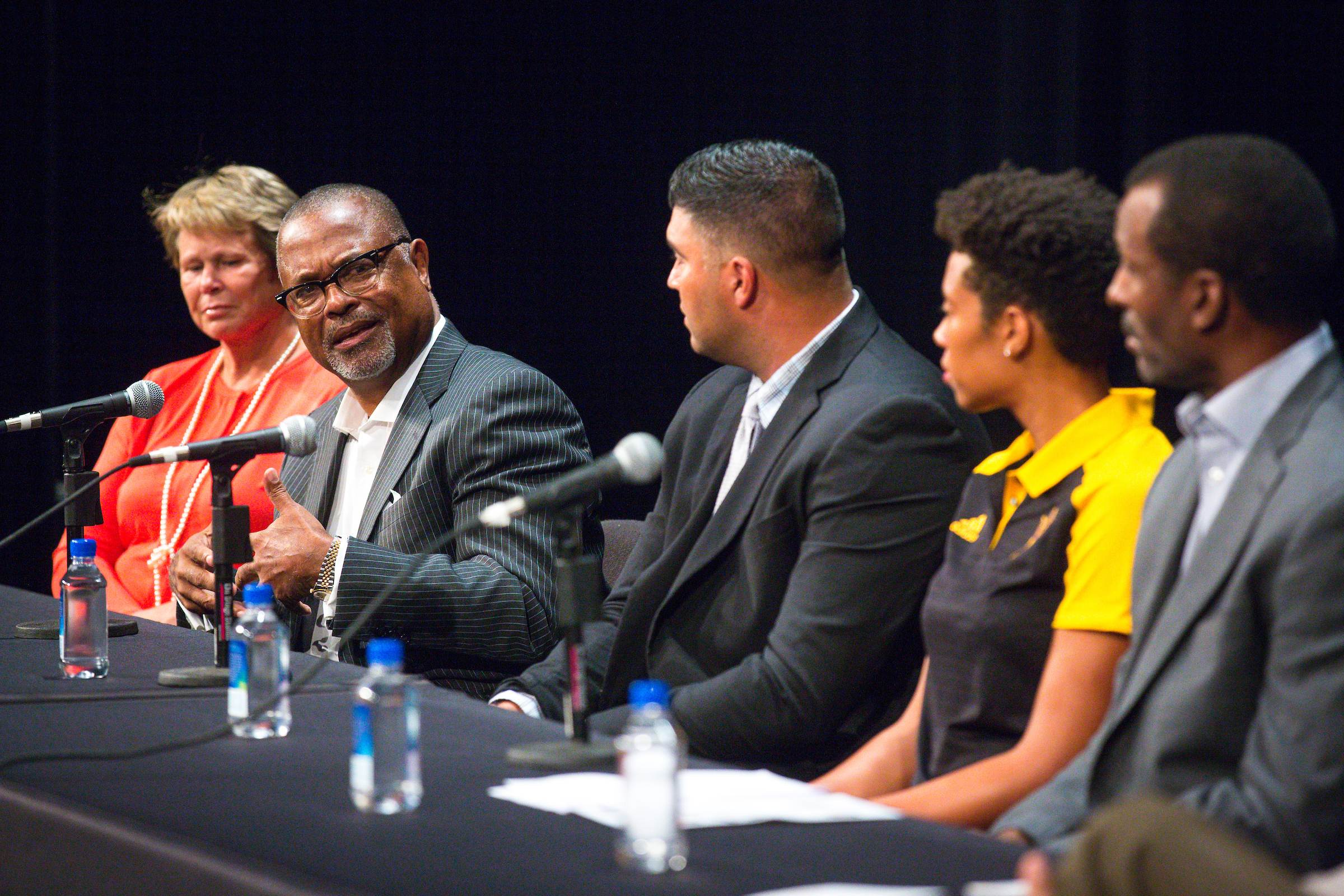NFL owner encourages athletes to use platform for social change

The principal owner for the Miami Dolphins said today’s athletes are starting to recognize their power as change agents for social good and that they should take advantage of their platform to shine a light on injustice whenever possible.
“This isn’t about publicity, but doing something that can have impact in this country,” Stephen M. Ross said. “Athletes recognize the importance of their role in society, and so let’s take advantage of that.”
Ross’ comment was made at a town hall discussion on race and sports hosted by ASU Athletic Director Ray Anderson at the Mesa Arts Center on Monday.
ASU’s Center for the Study of Race and DemocracyThe center is housed in the College of Integrative Sciences and Arts. and the Ross Initiative in Sports for Equality sponsored the event, which drew about 200 people. The goal of the town hall and subsequent panel discussion was to bring together students, sports figures, academics and community leaders to have a dialogue about racism through the lens of sports and encourage critical thinking and positive change.
“This discussion gives us a framework for understanding the history between race and sports, what’s happening in our communities across the nation and the link between athletes and protest,” said Sarah E. Herrera, the center’s program director.
From San Francisco 49ers quarterback Colin Kaepernick’s refusal to stand for the national anthem as a protest to police shootings of unarmed black men to Carolina Panthers quarterback Cam Newton pushing for the Confederate flag to be lowered at the South Carolina State House to the Miami Heat donning hooded sweatshirts to recognize the shooting of teen Trayvon Martin, professional athletes are using their platform to protest what they see as civil and racial inequality.
“I am probably in the minority when it comes to NFL owners encouraging players to express these feelings and speak out,” Ross said. “This country needs it.”
Growing up in Detroit, Ross said he witnessed firsthand the negative impacts of racism and that he hopes to use his initiative to bring the sports community together to advance equality, respect and understanding.
The panel also included Ann Meyers Drysdale, vice president of the Phoenix Suns and Mercury; Mia Rycraw, a goalie for the ASU women’s water polo team; Eddie Johnson, former NBA standout and color analyst; Kenneth Shropshire, director of the Wharton Sports Business Initiative; and Michael Young, Glendale fire captain and Millennium High School football coach.
Speakers said the conversation was reminiscent of a bygone era when sports figures such as Jackie Robinson, Muhammad Ali, Jim Brown, Bill Russell and Kareem Abdul-Jabbar openly discussed racism, the anti-war movement and political and social change in the U.S.
After decades of aversion to protest, they believe professional athletes are starting to rediscover their voices as activists and role models.
“It makes me happy when parents say, ‘I admire you as a role model,’” Rycraw said. “It reminds me that I’m a role model for people who are younger and older, and I take that seriously.”
Kenneth Shrophsire (second from left) talks during a panel discussion with (from left) Ann Meyers Drysdale, Michael Young, ASU water polo goalie Mia Rycraw and Eddie Johnson at the Race and Sports Town Hall on Monday. Shropshire, who is on the faculty of the Wharton School at the University of Pennsylvania, talked about the lynching threats the black freshmen at the school received last week. Photo by Charlie Leight/ASU Now
Shropshire said sports is the closest thing the U.S. has to a national language and that he has formed lasting friendships as a result of his time playing football at Stanford.
“Some of my best friends in life are white guys I played with in college,” Shropshire said. “That’s the magic of sports as the vehicle to discuss diversity.”
Young said that diversity can be woven into the fabric of sports and that coaches have a new responsibility to young athletes.
“When I was growing up, it used to be about if you could play ball, but that’s now at the back of the list,” Young said. “I feel my role as a coach is to teach about character and fairness.”
The panel agreed that educating young athletes about race, justice and democracy is only part of the cure — the other half of the equation is educating adults.
“The biggest problem I’ve always had is with adults, not kids,” Johnson said. “I concentrate on them (adults) to see how they’re teaching, what they’re teaching and if they’re fair.
“And if they’re not fair, I call them out on it.”
Top photo: ASU Athletic Director Ray Anderson (right) talks with Miami Dolphins owner and founder of the Ross Initiative in Sports for Equality, Stephen M. Ross, at the Race and Sports Town Hall at the Mesa Arts Center on Monday. Ross said athletes should use their platforms to push for social change. Photo by Charlie Leight/ASU Now


